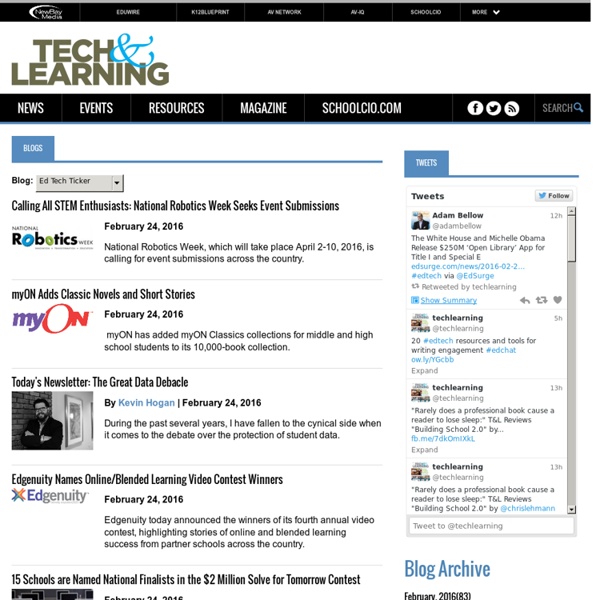



Ten Ways To Get Beyond Powerpoint With Classroom Projectors 4/12/2009 By: True tech integrators know the digital projector can be used for much more than projecting. Here is a sampling of some creative ways to use your projector in any curriculum. • Reading/Writing. Display images, words, or phrases for writing prompts in creative writing or poetry class. Model savvy formatting and editing skills by giving live demonstrations in your word-processing software. For almost eight years, Ron S. Emily Chang - eHub eHub is a constantly updated list of web applications, services, resources, blogs or sites with a focus on next generation web (web 2.0), social software, blogging, Ajax, location mapping, open source, folksonomy, design and digital media sharing. Visit eHub! Buzz and Blogosphere Sept 17, 2005eHub in The Social Software Weblog Barb Dybwad from The Social Sofware Weblog writes about eHub in her post, eHub and wsFinder: Web 2.0 applications and web services. September 16, 2005eHub cited by Stowe Boyd in Corante In today’s Get Real column at Corante, Stowe Boyd, President/COO of Corante, the world’s first blog media company, writes about discovering new web apps at eHub, a new resource by co-founder and Ideacodes principal Emily Chang. See Stowe Boyd’s post, Mapstats and Ajax apps at Corante. [Technorati tags: ajax, web 2.0, ruby on rails, social software, blogs, tagging, open source, strategic design, eHub, emily chang]
Bloom's Taxonomy Blooms Digitally 4/1/2008 By: Andrew Churches from Educators' eZine Introduction and Background: Bloom's Taxonomy In the 1950's Benjamin Bloom developed his taxonomy of cognitive objectives, Bloom's Taxonomy. Bloom's Revised Taxonomy In the 1990's, a former student of Bloom, Lorin Anderson, revised Bloom's Taxonomy and published this- Bloom's Revised Taxonomy in 2001.Key to this is the use of verbs rather than nouns for each of the categories and a rearrangement of the sequence within the taxonomy. Bloom's Revised Taxonomy Sub Categories Each of the categories or taxonomic elements has a number of key verbs associated with it Lower Order Thinking Skills (LOTS) Higher Order Thinking Skills (HOTS) The elements cover many of the activities and objectives but they do not address the new objectives presented by the emergence and integration of Information and Communication Technologies into the classroom and the lives of our students. Bloom's digital taxonomy map Remembering Understanding Applying Analysing Evaluating
TechCrunch Web2.0 Flashcard Sites 3/28/2009 By: By Jenn Farr I must admit I have a bit of an aversion to drill-type activities, but I realize there are times that students need to practice and memorize certain concepts in order to succeed. Certainly we all know that studying makes for more successful learners. Abraham Lincoln clearly knew the value of studying when he said, “I will study and get ready, and perhaps my chance will come.” I doubt that Abraham could have imagined the neat Web 2.0 flashcard-type applications that our students can now use to help them with their studies. I wish my daughter had access to StudyStack when she was studying for her Physician Assistant certification. A different repository of electronic flashcards can be found online at Flashcard DB. Another very large database of flashcards can be found at the Flashcard Exchange. Quizlet is another excellent little application that will help students study vocabulary words. Jen Farr, blog:
Webware The Social Gaming Network, which operates gaming applications like Warbook and Super Snake for social-networking developer platforms, announced on Thursday that it has opened a platform of its own. Developers can now access an application program interface (API) so that they can contribute; the company is set to let developers in on Thursday night and put out more information next week at the Game Developers' Conference. The Social Gaming Network is owned by Webs.com, the Web 1.0 veteran formerly known as Freewebs, and currently works with Facebook and Bebo's platforms. It's the second gaming start-up to put out an announcement about developers this week.
Trackle - Your Personal Tracker on the Web 16 Teams Remain Alive; Who Has The Best High School Cheerleaders In Georgia? - High School News Story The videos from the four finalists have been sent to the Atlanta Hawks for them to pick the winner. We will announce the winner as soon as we hear back. We expect to hear back by the 21st at the latest, but hopefully sooner. Stay tuned. Who has the best high cheerleaders in Georgia? The voting competition has determined the final four teams. Congratulations to the Rome High School cheerleaders, Wesleyan Cheerleaders, Pope High School Cheerleaders and the Centennial High School Cheerleaders for winning their brackets. #1 SW DeKalb vs. #16 Kennesaw Mtn. -------------------------- #1 SW DeKalb vs. #8 Lassiter#8 Lassiter vs. #9 Ola __________________ #1 SW DeKalb vs. #12 Brookwood#5 Stockbridge vs. #12 Brookwood -------------------------- #12 Brookwood vs. #4 Marist#4 Marist vs. #13 Washington _______________________________________#12 Brookwood vs. #11 Rome SKYHAWK BRACKET #4 Pope Wins The Bracket #3 Kell vs. #14 Union County -------------------------- #3 Kell vs. #6 St.
Trading Card Maker: Create a trading card from your digital photos Tons of fun stuff... Give one of our toys a spin! Trading Card, Mosaic Maker, Bead Art, Framer, Pocket Album, Color Palette Generator, Map Maker, Jigsaw, Cube, Magazine Cover, Movie Poster, Motivator, FX, Hockneyizer, Photobooth, Calendar, Billboard, Mat, Badge Maker, Pop Art Poster, Wallpaper, CD Cover, Lolcat Generator, I know, right? Song Search Engine Song Search Engine Just Hear It is a song search engine that lets you play-back the music right in the browser, without registering or paying. The About page explains “just hear it pays for licenses from all the major performing-rights organizations ... which then pay the publishers and writers in proportion to the number of plays they get”. The colors on the site don’t make for the easiest reading (small gray-on-black fonts) and you won’t be able to find just any song, but the selection from what I tried was still pretty broad. [Via Ionut!] >> More posts Advertisement This site unofficially covers Google™ and more with some rights reserved.
Classroom 2.0